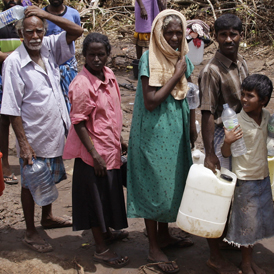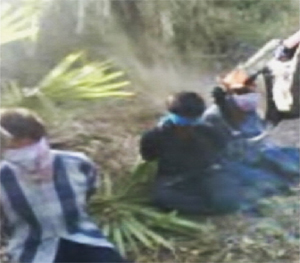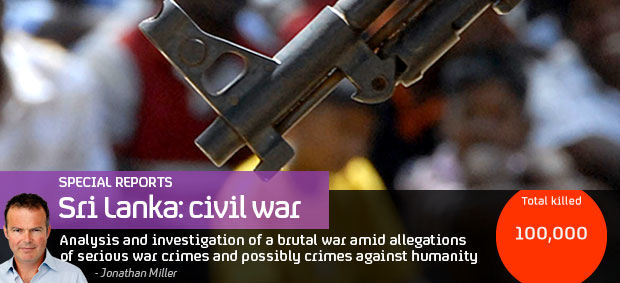Killing Fields video evidence ‘builds case for war crimes’
Footage of alleged war crimes in Sri Lanka, with its echoes of Srebrenica, means the international community is more likely to act, a top lawyer tells Channel 4 News. But is prosecution possible?

Documenting the final weeks of the bloody civil war when an estimated 40,000 people died, the Channel 4 documentary Sri Lanka’s Killing Fields reveals shocking new evidence of serious war crimes.
The film includes footage of government soldiers executing bound prisoners; the dead bodies of naked, abused women dumped in a truck; and the bombing of civilian hospitals.
The barbaric images were captured on mobile phones, many apparently by government soldiers filming grim trophy videos.
The faces of a number of the soldiers can be seen while conversations are heard as the killings are discussed.
In one video, a soldier admits he would like to mutilate the corpse of a dead naked woman “if no one was around”.
Calls for investigation
While pressure builds on the international community to answer calls for an investigation, a top international lawyer has told Channel 4 News the use of new technologies has created a sea change in the reporting of serious crimes.

Mobile phone footage, pictures and testimony distributed online has seen information become instantly accessible to a global audience.
“There has never been a greater awareness of these types of crimes than right now, and it is because of the use of social media,” Mark Ellis, chief executive of the International Bar Association, told Channel 4 News.
“It is much more difficult for the international community to stay silent when facing this onslaught of evidence shown by the social media process – it increases the likelihood that the international community must act.”
Pakistan video emerges
In recent weeks amateur footage from Syria has captured apparent abuses by the security forces in an increasingly brutal crackdown on protesters.
It followed similar footage which emerged from Egypt, Libya and other countries in the Arab Spring.
In Pakistan, a video has reportedly been posted online showing a man in military fatigues physically assaulting four blindfolded men.
The authorities have said they are looking into the footage, which is part of a “dedicated campaign” to discredit the Pakistan security forces.
Although the video has not been independently verified, it is not the first video to have been posted online depicting allegations of abuses in Pakistan.
Echoes of Serbia
Footage of alleged crimes in Sri Lanka carries echoes of the filming in 1995 of the Srebrenica massacre, in which up to 8,000 Muslim men and boys were shot dead by a paramilitary group.
During the Bosnian war the Scorpion paramilitary group videotaped the massacre, and can be seen laughing, smoking and taunting their captives before shooting them in the back.

The video was later used as key evidence in a war crimes trial prosecuting those involved.
“Only when that video emerged of soldiers killing men and boys did the people in Serbia become aware, and in fact accept, that crimes were committed,” Mark Ellis told Channel 4 News.
“Up until that point it was very difficult to see that their own forces committed these crimes.
“The video of the Srebrenica killings saw a remarkable change occur in Serbia. This type social media information confronts a denial that permeates these types of conflicts.”
Does video evidence make prosecution easier?
Dr Ellis said user generated video, such as the mobile phone footage gathered in Sri Lanka, can provide “a catalyst for a legal process to bring those responsible to justice”.
This evidence, Dr Ellis said, can provide crucial documentation to build a case for a war crimes prosecution. But significant political hurdles are still evident.
In the case of Sri Lanka, a UN report has recognised that there is evidence to suggest both the government and the Tamil Tigers committed serious war crimes.
Following the broadcast of Sri Lanka’s Killing Fields, Prime Minister David Cameron on Wednesday called on the UN to investigate properly the events in Sri Lanka’s bloody 25-year civil war so that “lessons are learned”.
UN Secretary-General Ban Ki-Moon – who has recently launched his re-election bid – faced criticism for saying he lacks the authority personally to order an investigation into the allegations.
The UN says an international inquiry would need a vote of co-operation at the Security Council, which is likely to be vetoed by Russia and China who are against such a move.
